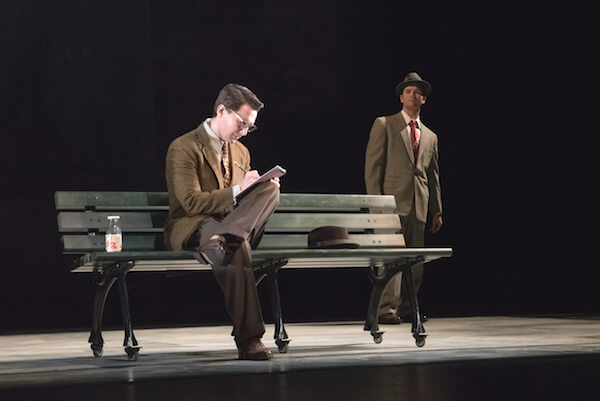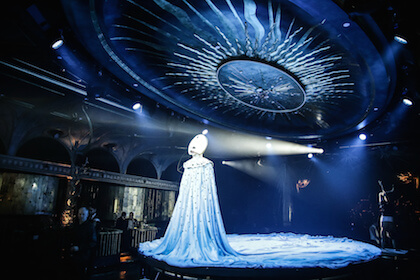Brandon Flynn and Jeffry Denman in John Kander and Greg Pierce's “Kid Victory,” directed by Liesl Tommy, at the Vineyard Theatre through March 19. | CAROL ROSEGG
BY DAVID KENNERLEY | The illustrious John Kander has never been one to shy away from outré material. For “The Scottsboro Boys,” the final musical score he composed with the late Fred Ebb, he infused minstrelsy into a harrowing story of racial discrimination in the Deep South. Although the bold musical was well received at its 2010 premiere at the Vineyard Theatre, its Broadway turn flopped. Tourists stayed away in droves.
“Kid Victory,” his latest effort also at the Vineyard, written and scored with current writing partner Greg Pierce, takes on another prickly topic unlikely for a musical: child abduction. And while the team should be lauded for bringing such a daring subject to life onstage, the execution falls short. Liesl Tommy (“Eclipsed”) directs.
The book, focusing on the re-entry of 17-year old Luke (his online screen name is Kid Victory) after several months’ disappearance, is awkwardly integrated with the score. Likewise, the bizarre notes of joviality don’t mesh with the serious drama. Characters suddenly burst into song, but since we don’t know who they are, we don’t care. A chorus of nosy members of a Baptist church fellowship loiters onstage, singing out at odd moments, which does little to amplify the drama.
A Kander and Pierce tuner about a wayward closeted teen charting his own course
What’s more, the book is full of holes, requiring broad suspension of disbelief. In today’s digital age, how is it possible that Luke could go undetected for months? There’s a provocative song, “Not Quite True,” which finds the detective grilling Luke about inconsistencies in his story, but there’s no follow-up. Perhaps the scene is a fantasy, though it’s not clear.
Oh, and did I mention that this is a musical where the titular lead, who is onstage the entire 105 minutes, does not sing a single note?
Not that the show is a complete disaster. The most engaging number, “What’s the Point?,” is a jazzy, distinctly Kander-esque ode to spontaneity. The song finds a very nervous Luke on a late-night online hookup with an exuberant young guy who tries to tap dance his way into Luke’s heart (or, at least his pants).
“What’s the point of living,” the frisky guy sings, “if your hand is always steady, if you always think you’re ready. What’s the point?”
To the show’s credit, this is no ordinary abduction tale, adding fresh twists typically absent from media coverage of such tragic events. The story jumps back and forth between the present — at post-traumatic Luke’s modest home in a tiny Kansas town and the lawn store where he now works as an assistant — and the past, the basement where he was imprisoned by Michael, his psychotic abductor. Luke’s only friend seems to be his new boss, Emily (Dee Roscioli), a brash, straight-talking free spirit.
Harsh truths are confronted, if not fully explained. Was Luke a willing victim? And if he was, was it Stockholm syndrome or was he in love with his captor?
The talented cast does its best to bring coherence to this muddle of a musical. As the sullen, taciturn Luke, Brandon Flynn deftly articulates the complexities of the conflict between staying with his doting, God-fearing parents and his need to strike out on his own. And his confusion about his burgeoning sexuality is deeply affecting.
Karen Ziemba’s portrait of Luke’s kindhearted but niggling mother has an arresting, piquant honesty. For all her smothering and Bible-thumping, we still feel empathy toward her.
Also praiseworthy is Jeffry Denman’s portrayal of Luke’s abductor, which sidesteps stereotype by injecting a dose of humanity. His Michael is whip-smart and desperately lonely, exuding a brutal, sexy magnetism that’s exceedingly creepy.
Clint Ramos designed the sinister set of a dingy, cluttered basement with one tiny window, a bare mattress, and shackles hanging from a cement column. Even during scenes at his home or work, the basement looms in the background, suggesting Luke has yet to shake the trauma of his ordeal. Or that his home is a kind of prison as well.
The exceedingly dour “Kid Victory” isn’t sure whether it wants to be a gripping detective drama, a cautionary coming out tale, or an entertaining musical satire. In this confused, overeager production, it is none of the above.
KID VICTORY | Vineyard Theatre, 108 E. 15th St. | Through Mar. 19: Tue.-Thu. at 7 p.m.; Fri.-Sat. at 8 p.m.; Sat.-Sun. at 3 p.m. | $85-$100 at VineyardTheatre.org | 105 mins., with no intermission



































